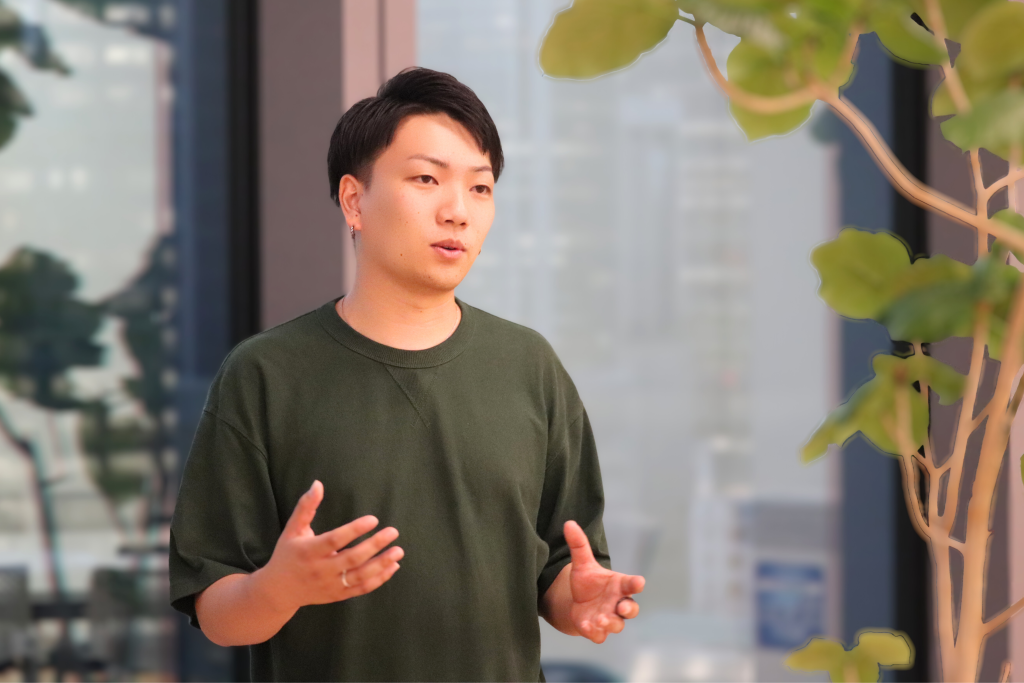
– To begin, could you please introduce yourself?
I’m from Ube City, Yamaguchi Prefecture. I studied engineering at Ube National College of Technology and Toyohashi University of Technology. While still at university, I started my first business, and today I serve as CEO of Lirem Inc., an innovation support company, and as representative of Hi-Okoshi Association, an educational non-profit organization, both based in Aichi Prefecture.
Through both profit and non-profit activities, my goal is to help create communities and societies where people can live true to their “will” — what they truly want to do.
– What motivated you to apply to Shizenkan University?
The company I run just entered its fifth year. When I first started, my motivation was honestly quite simple — I just thought being a CEO looked cool. But as I continued to run the business, I began asking deeper questions: “What does it really mean to be a manager?” and “How should a company contribute to society?” Those reflections made me realize the importance of having a solid management philosophy.
I first learned about Shizenkan through an introduction from one of its faculty members. Initially, I thought there was no way I could manage the time — balancing a full-time CEO role with an MBA program sounded unrealistic. Plus, since my company is based in Aichi, commuting to Nihonbashi seemed impractical. That was my honest first impression.
However, when I looked at Shizenkan’s website, the mission — “Cultivating the next generation of leaders who will transform society” — immediately caught my attention. The more I researched, the more I realized how deeply Shizenkan’s philosophy and curriculum aligned with my own aspirations. I was also drawn to the concept of bridging East and West, and intuitively felt this presented an ideal opportunity to deepen my reflection on my management philosophy and principles, and how I should engage with society going forward. This led me to decide to apply.
– It’s been two months since you enrolled. What have you learned or discovered so far?
Even in this short time, my learning at Shizenkan has already had a profound impact on my work and behavior. The program constantly challenges me — both as a person and as a manager — to ask, “What do I truly think?”
I believe that every decision a leader makes reflects their management philosophy. Through Shizenkan’s classes, which deal with essential and diverse questions, I’ve been able to refine my own philosophy from multiple angles. Currently, I’m revisiting and reconstructing the programs we offer at my company to better reflect this updated philosophy.
During the Leadership Night session, I was deeply inspired by the talk from Takashi Kawazoe, who emphasized the importance of pursuing one’s management philosophy relentlessly. His message — that a business becomes truly unique and valuable when its leader embodies a well-defined philosophy — struck me deeply. When I learned that he writes a daily reflection journal, I started doing the same that very night.
At the same time, many of my peers at Shizenkan are highly accomplished business professionals with extensive experience. Their insights and the quality of their discussions often amaze me, and that in itself motivates me to keep growing as a leader.
– What are your goals for the next two years?
Through my studies at Shizenkan, I want to explore a grand theme — rethinking capitalism and creating a society where people can live richly and humanly.
Capitalism has long prioritized “making more money,” and in doing so, it has often led to environmental degradation and excessive consumption of resources. I want to help transform that.
Earlier this year, I took on a new challenge in fundraising. Instead of relying on venture capital — which typically expects an exit — I chose a DPO (Direct Public Offering) model, which allows individuals who share our mission to invest directly in our company. This approach enables people to support not an exit strategy, but a vision — the society we want to create together.
Through this DPO, we successfully raised about 30 million yen from 36 supporters, including local business owners, municipal officials, and friends. Going forward, I want to continue embodying what I learn at Shizenkan — not just studying in theory, but applying my learning through real management practice.
– Finally, do you have any advice for prospective applicants to Shizenkan?
I can honestly say that coming to Shizenkan was one of the best decisions I’ve made.
For young entrepreneurs in particular, this is an incredibly valuable place to learn. Many young leaders focus on business plan contests or pitch competitions, which are great for sharpening business ideas and skills — but I’ve realized that those alone don’t make you a richer or deeper leader.
If you want to develop genuine depth as a leader, Shizenkan is the right place. It’s rare to find an MBA program that integrates Eastern philosophy into management education. Through my own journey here, I hope to cultivate a strong management philosophy and expand my capacity as a leader — not only to create impact locally, but to view my business from a truly global perspective.
(Interview conducted on October 9, 2025)
| Related LinksApplication Information: Social Innovation Scholarship
ContactShizenkan University Graduate School – Admissions Office Nihonbashi Takashimaya Mitsui Building 17F, 2-5-1 Nihonbashi, Chuo-ku, Tokyo 103-6117 E-mail: admissions@shizenkan.ac.jp |
